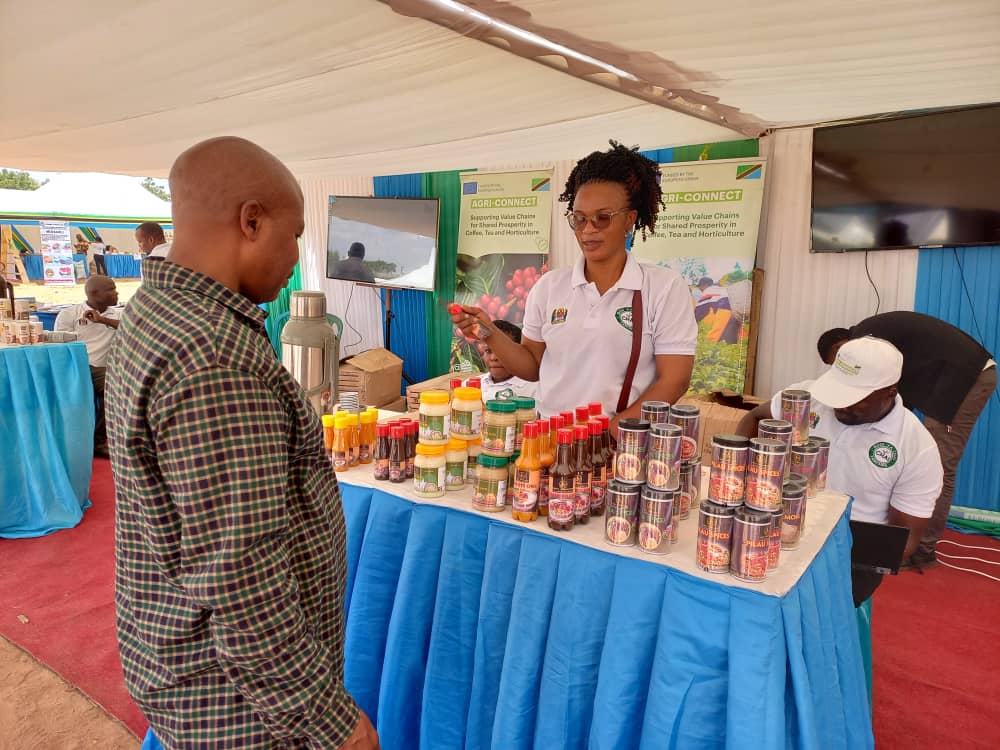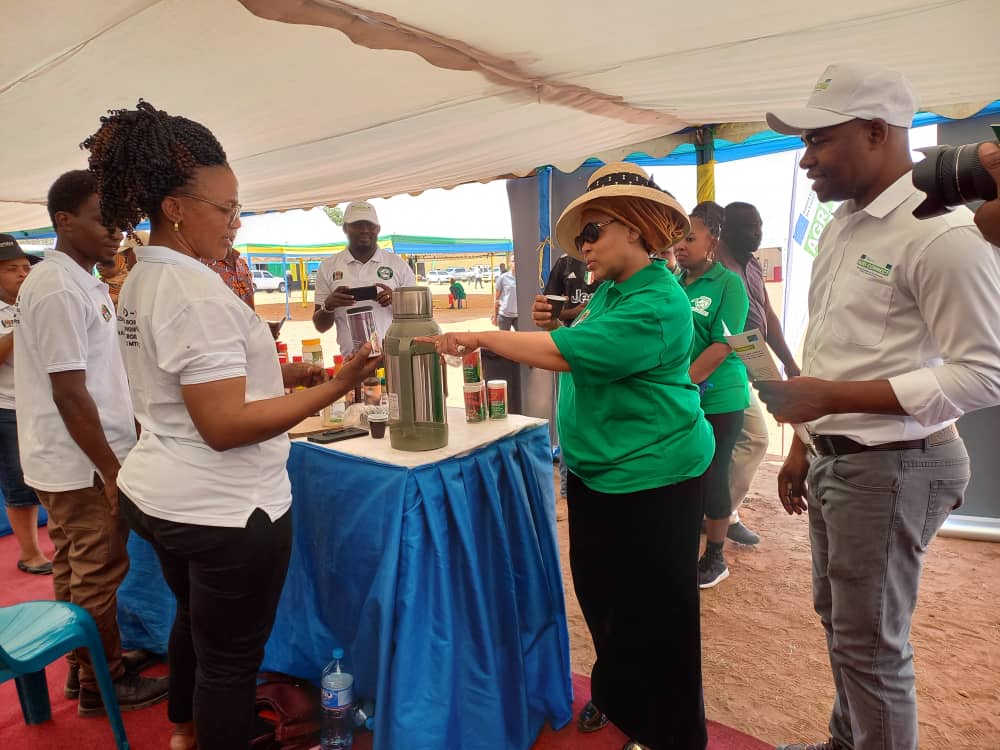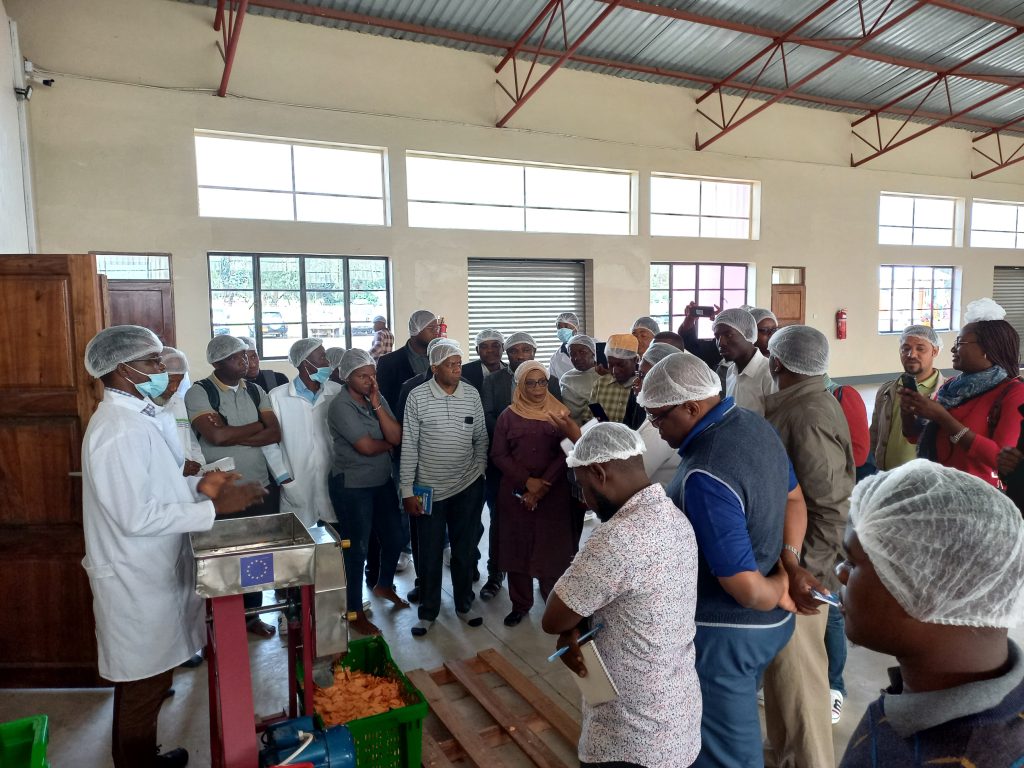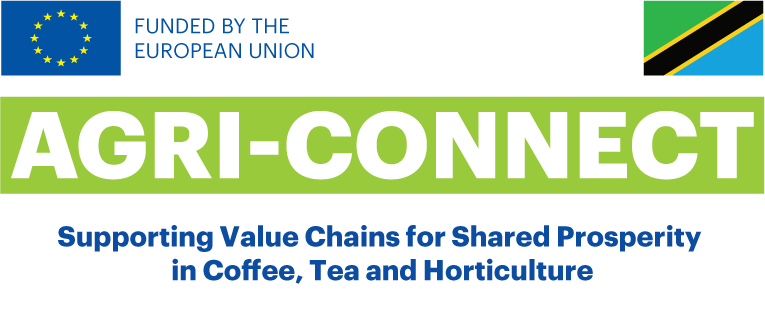
KIBOWAVI project transforms the lives of entrepreneurs in Mbeya.
Bertha Mwaipopo had a dream for success, but she didn’t have the sense of how it would work out into reality.

Bertha Mwaipopo, on the left, explaining her product to the then Shinyanga Regional Commissioner Hon. Sophia Mjema (with green t-shirt on the right) during the World Food Day at Bariadi grounds, Simiyu region 2022.
To her, it seemed very far-fetched dream; until she joined the Kibowavi project.
Kibowavi, a Kiswahili short form for empowering women and youth in horticulture production and marketing, is a project supervised by Helvetas Swiss Intercooperation under European Union (EU) funded program, Agri -Connect, aspiring to contribute towards inclusive economic growth, promote private sector development and job creation in the horticulture sector and increase food security and nutrition in the southern highlands of Tanzania
In 2018, Mwaipopo set on a spice processing business to make a livelihood, like many small business entrepreneurs in Tanzania.
However, she faced several challenges including lack of essential entrepreneurial skills, limited awareness of the regulations and standards, lack of financial support, poor understanding of consumer needs and weak networking.
Under Kibowavi project, she went through numerous trainings on entrepreneurship, processing and marketing skills, before being introduced to Mbeya Food Processing Park, which was a game changer for her career.
“Formerly I was doing pure subsistence activity. I had a very limited knowledge on what I was doing. I used to park 20 to 50 packets of spices per day and struggling for the market. After Kibowavi introduced us to Mbeya Food Processing Park, everything changed for better,” she said during an interview with The Guardian.
Mbeya Food Processing Park (MFPP) is a strategic project conceived and financed by the Mbeya City Council and HELVETAS Tanzania under the KIBOWAVI project.

Part of the technical working group members on horticulture for the AGRI-CONNECT programme during their field trip at Mbeya Food Processing Park, early March 2023.
It aims at addressing the problem of insufficient value addition to the Tanzanian horticultural products, by equipping small scale processors in Mbeya, with the necessary processing and marketing capacity.
It is now contributing greatly in enhancing the targeted processors’ incomes and stimulates the overall regional economy across horticulture value chain.
The Mbeya Food Processing Park supervisor, Suzan Julius said the park is playing significant role in maintaining the quality and nutrients of the processed food and thus making consumers of their product gain all the nutritious value of the products.
“Our role is ensuring quality without contamination of the food we process here to maintain the nutritional value of all the food that passes through our park,” the supervisor said.
She said the park processes horticultural products, and urges all farmers around Mbeya and beyond to use the park for processing their foods, instead doing it locally.
“We have taken all necessary measures by using the technology we have, from receiving the products, cleaning, drying, storage and processing. We all do this professionally, so that we can maintain quality and avoid food waste,” she explained.
The Park has turned Mwaipopo, a mother of three, has graduated from a petty trader into the Chief Executive Officer (CEO) of Lintu Product and General Supply, which is processing 16 types of spices, with the capacity of producing 2,000 pieces of each product per week.
“The market is now expanding I now have customers beyond Mbeya. I supply to Katavi, Songwe, Mwanza, Arusha, Dodoma and Dar es Salaam and many of my clients are super markets and groceries,” she says.
“Thanks to Kibowavi project as it has opened the world for me and I am leading a comfortable and quality life. I have managed to put my kids in best schools and the elder one is pursuing an undergraduate degree at Mzumbe University, Mbeya Campus,” she said.
Located at the old Mbeya Airport in Lyela ward, the Mbeya Food Processing Park is equipped with buildings, milling machines, washing, drying and storage facilities, laboratory as well as a spacious super market.
Its existence gives huge industrial and entrepreneurial support to small and medium processors engaging in processing of horticultural crops, with shared high standard machinery and other supporting facilities.
“Thepark enables small and medium producers and entrepreneur improve quality of their products, comply with food safety standards, expand their businesses and access local, regional and international markets through common marketing,” says Daniel Kalimbiya the program director, Helvetas Tanzania.
Kalimbiya says the park is serving as a platform for training and learning on various processing, packaging and marketing techniques, business management and strategies. It also enables easy access to the dedicated group of processors at one location by various government and non-government institutions for consultation and other engagements.
“The standardized processing environment will warranty certification by quality standards bodies in the country like Tanzania Bureau of Standards (TBS) and others thus enhancing marketability within local and foreign markets”, adds Kalimbiya.
In order to complement the food park and fulfill the intended mission, the Kibowavi project launched out into the deep by building capacity for farmers on good agricultural practices, climate smart agriculture and post-harvest management, where 21,334 farmers were trained surpassing the target of 15,000.
Others were trained on organic farming, where 78 were trained, while the target was 50 farmers.
On processing standards, 132 were trained out of 150 targeted farmers while the nutrition sensitive practices attracted 280 trains exceeding the 250 target and 16,478 farmers were capacitated.
According to him, on access to finance, group management and business management skills beneficiaries went beyond the targeted 15,000.
Together with government efforts and other intervention like Kibowavi project, there have been significant changes in the region especially on improved nutrition because of food diversification and behavior change that lead to reduction of stunts amongst children.
According to Tanzania Healthy Demographic Survey 2022/2023, Mbeya has reduced stunts from 37.7 percent to 31.5 percent, Songwe from 37.7 percent to 31 percent while Katavi managed to lessen stunting from 38.8 percent to 32.2 percent.
“The healthy demographic survey results are encouraging, our efforts through Kibowavi project together with other government initiatives and other actors help brought down stunting in our project areas,” says Felix Bachmann Helvetas Country Director.
The Park was originally proposed to run under Public Private Partnership (PPP) between Mbeya City Council and a private company.
This post is produced with the financial support from the European Union through AGRI-CONNECT Programme. Its contents do not necessarily reflect the views of the European Union.
This article is republished from The Guardian. Read the original article

